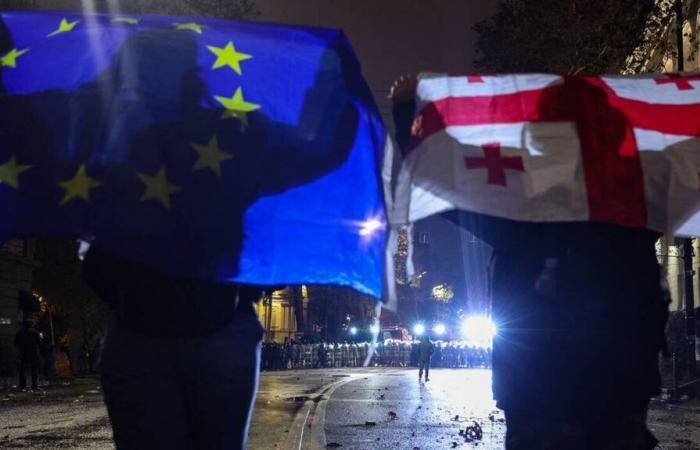They have been taking to the streets to defend their European dream for five days now. In Georgia, the former Soviet republic of the Caucasus, at the crossroads of Europe and Asia, anger has been growing and the mobilization of citizens has been gaining momentum since Thursday, November 28, the date on which the ruling party, Dream Georgian, postponed accession negotiations with the European Union until 2028.
This decision raises questions, in a country where more than 80% of the population claims to be pro-European and whose objective of membership in the EU and NATO is written in black and white in the Constitution. The government remains deaf to the people's anger, refusing talks with the opposition and toughening repression – 224 arrests since Thursday and 26 injured (including three police officers) just on the evening of Monday, December 2. Here is the situation summarized in three questions.
1. Why is the Georgian Dream party accused of rigging the elections?
“There will be no revolution in Georgia”, Georgian Prime Minister Irakli Khobadidze insisted earlier in the day. The latter is engaged in a standoff with the President, Salomé Zourabichvili, who accuses him of being influenced by Russian power and of having rigged the legislative elections won on October 26 by Georgian Dream with 54% of the votes.
This suspicion is based in particular on the conclusions of a group of observers who spoke of a complex system of large-scale fraud. Several countries have expressed reservations about these results. The European Union has demanded an investigation into what it called « graves » irregularities and said she would send a mission to Tbilisi in the coming weeks. Some 160 Georgian diplomats have criticized this decision: considering it contrary to the Constitution, they fear that it will lead “in international isolation” of the country. Many Georgian ambassadors also resigned in protest. The leaders of Georgian Dream do not hide their hostility towards the West, like the party's leader, the powerful and extremely wealthy oligarch Bidzina Ivanishvili, close to Moscow.
2. Why does Russia’s influence crystallize the mobilization?
For almost ten years now, Moscow has interfered in the internal politics of many Eastern European countries of the former USSR. By exacerbating nationalist sentiment and riding on the migration crisis, inflation and elite distrust, Vladimir Putin is bringing back many countries under his influence. Starting with Viktor Orban's Hungary, Peter Pellegrini's Slovakia or more recently Romania where the pro-Russian candidate rose against all expectations to the second round of the presidential election, after a massive campaign on the Chinese social network TikTok .
Other countries such as Serbia and Montenegro are also seeing pro-Russian influence increase in public opinion. In Georgia, the decision to postpone EU accession negotiations sparked a fire. Journalists, influencers, athletes… Civil society has taken stock of the events and is experiencing this period as an existential turning point.
Also read: War in Ukraine. These 500 ghost oil tankers who finance the Kremlin and threaten our coasts
3. Is Georgia following in Ukraine's footsteps?
Georgia remains traumatized by the invasion of Russia in 2008 which, after a brief war, recognized the independence of two separatist Georgian regions bordering its territory. It's difficult not to draw a parallel with Ukraine, although the history of the two countries and their geography are not different.
In 2013, the pro-Russian Ukrainian president, Viktor Yanukovych, betrayed the population's European aspirations by refusing to sign an association agreement with the EU. This about-face triggered the Maidan revolution. In response, Russia annexed Crimea a year later, strengthening anti-Russian sentiment among Ukrainians and pushing the country closer to NATO. With the consequence of the war that we know today.






